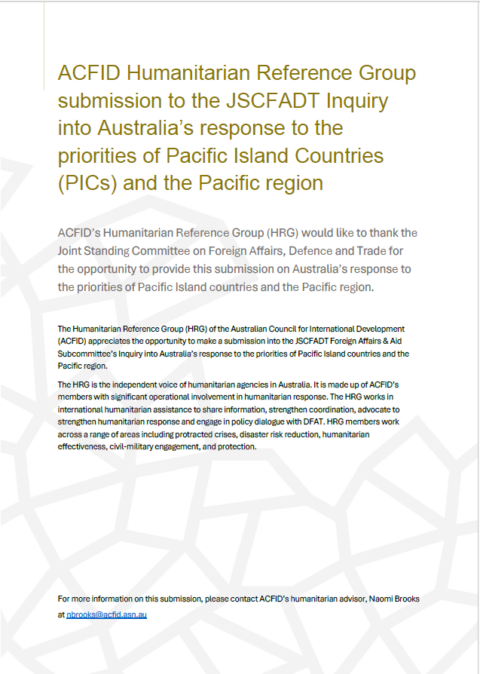Publications
Welcome to ACFID’s publications page. Here, you can find resources from ACFID, the NGO community and our partners, including submission reports, media releases, policy papers, practice notes, tools and guidance documents.
Select keyword
- All Keywords
- Aboriginal and Torres Strait Islander
- Accountability
- Accreditation
- ACFID
- ACFID Conference
- Advocacy
- Aid Effectiveness
- ANCP
- Asylum Seekers
- Audit Commission
- Australian Council for International Development
- Budget
- Child Protection
- Child Rights
- Civil Military
- Civil Society
- Climate Change
- Code
- Complaints Handling
- Compliance
- Conference
- Conflict of Interest
- Counter-terrorism
- Deductible Gift Receipt
- Development Effectiveness
- Development Financing
- Development Policy
- Disability
- Education
- Emergency Response
- Environmental Protection
- Ethical Research
- Evaluation
- Faith based
- Financial
- Financial Management
- Food Security & Agriculture
- Gender Equity
- Good Governance
- Government
- Health
- Human Resources
- Human Rights
- Humanitarian Management
- Humanitarian Response
- Inclusive Development
- Innovation
- Marketing & Fundraising
- Millennium Development Goals
- Monitoring & Evaluation
- Monitoring Evaluation and Learning (MEL)
- New member
- NGO Effectiveness
- Non-development Activity
- Not-for-Profit Regulation
- ODE
- Partnerships
- Peace & Security
- Policy
- Post 2015
- Private Sector Engagement
- Program Management
- PSEA
- Research
- Safeguarding
- SDGs
- Senate
- Sexuality
- Sustainable Development
- Sustainable Development Goals
- Think Tank
- UN
- Uni Linkages Conference
- Urbanisation
- Volunteering
- WASH
- Womens Empowerment
- Youth Engagement
Select Resource Types
Select Region
Select Publication Years
Other Resources
Select the Keywords
- All Keywords
- Accountability
- Accreditation
- ACFID
- Environmental Protection
- ACFID Conference
- Inclusive Development
- Aboriginal and Torres Strait Islander
- NGO Effectiveness
- Good Governance
- Program Management
- Sustainable Development
- Climate Change
- Civil Society
- Conference
- Compliance
- Australian Council for International Development
- Code
- ANCP
- Disability
- New member
- Child Rights
- PSEA
- Safeguarding
- Policy
- Gender Equity
- Ethical Research
- Complaints Handling
- Financial Management
- Partnerships
- Aid Effectiveness
- Monitoring Evaluation and Learning (MEL)
- Advocacy
- Human Rights
- Education
- Marketing & Fundraising
- Government
- Sexuality
- Human Resources
- Humanitarian Response
- Sustainable Development Goals
- Senate
- Development Effectiveness
- Womens Empowerment
- Child Protection
- Non-development Activity
- Budget
- Peace & Security
- Millennium Development Goals
- Innovation
- SDGs
- Humanitarian Management
- Emergency Response
- Private Sector Engagement
- Faith based
- WASH
- Financial
- Civil Military
- Not-for-Profit Regulation
- Asylum Seekers
- Post 2015
- Development Financing
- Youth Engagement
- Evaluation
- Research
- Volunteering
- Uni Linkages Conference
- Audit Commission
- Deductible Gift Receipt
- Monitoring & Evaluation
- Counter-terrorism
- Urbanisation
- Conflict of Interest
- Food Security & Agriculture
- Health
- Development Policy
- Think Tank
- UN
- ODE
Select the Resource Types
Select the Region
Select the Publication Years




